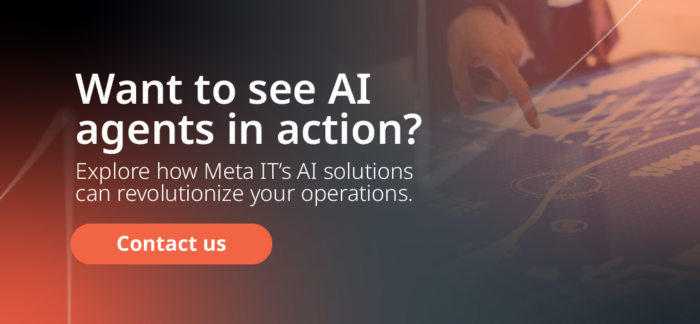Unleashing the potential of Artificial Intelligence Agents in modern business
Artificial Intelligence (AI) has reshaped industries, and Artificial Intelligence Agents are at the forefront of this transformation. By leveraging machine learning, automation, and natural language processing (NLP) – a field of AI that enables machines to understand, interpret, and respond to human language – Artificial Intelligence Agents perform complex tasks, streamline workflows, and enhance decision-making, driving innovation across sectors.
As AI adoption accelerates, companies in healthcare, finance, and retail are already seeing benefits such as cost reduction and improved customer personalization. According to McKinsey, the AI agent market is poised for significant growth, driven by advancements in generative AI and increased computing power.
But what exactly are AI agents, how do they work, and why are they central to digital transformation? Let’s explore these questions in this article.
Artificial Intelligence Agents and the role of Agentic AI
Although the terms Agentic AI and AI agents are often used interchangeably, they refer to distinct concepts. Agentic AI is a broad framework that enables AI systems to act autonomously, learn continuously, and make independent decisions. AI agents, on the other hand, are specific implementations of this concept, designed to execute defined tasks within set contexts.
In essence, Agentic AI provides the foundation for autonomy, while AI agents apply these principles to real-world business solutions, such as chatbots, virtual assistants, and recommendation engines. This distinction is crucial for understanding how businesses leverage AI agents to enhance efficiency and automate processes.
What are Artificial Intelligence Agents?
AI agents are intelligent software systems designed to function independently, executing tasks based on data and predefined objectives. Unlike conventional virtual assistants like Siri or Alexa, AI agents are capable of deep system integration, continuous learning, and adaptive automation. In healthcare, AI agents analyze vast amounts of patient data to assist doctors in diagnosing diseases more accurately. In logistics, they monitor real-time deliveries, detect delays, and suggest optimized routes to ensure timely shipments. In finance, AI agents detect fraud patterns and automate risk assessments for financial institutions. By combining machine learning, NLP, and automation, AI agents drive smarter decision-making, optimize operations, and enhance business agility.
How do Artificial Intelligence agents work?
AI agents operate through a structured workflow that follows best practices from leading technology providers like AWS, McKinsey, and Oracle. Their process typically includes goal definition, where AI agents interpret user instructions and translate them into actionable objectives. They collect and process information from multiple sources, such as ERP systems, IoT sensors, and cloud databases. Task execution follows, where AI agents perform tasks iteratively, refining performance through feedback loops powered by machine learning and NLP.
Finally, AI agents continuously improve, learning from past interactions to enhance efficiency and accuracy. This adaptive and autonomous cycle enables AI agents to function effectively across industries, from customer service to predictive analytics and operational management.
The benefits of Artificial Intelligence agents for businesses
Companies leveraging AI agents experience significant advantages, including automation of repetitive tasks, improved decision-making, enhanced customer experience, and operational scalability. AI agents streamline operations, reducing costs and improving efficiency while processing vast datasets in real time, enabling data-driven business strategies. AI-powered chatbots and recommendation engines provide personalized, real-time interactions, and AI agents handle high-volume tasks without the need for constant human intervention. Enterprises using AI agents report increased productivity, accuracy, and agility, making these systems indispensable for businesses aiming to scale and innovate.
Challenges in implementing AI agents
Despite their benefits, AI agents also present challenges that businesses must address. Data privacy and security remain top concerns, as AI agents process vast amounts of sensitive data, requiring robust encryption and compliance measures. Bias in AI models can lead to unintended discrimination, highlighting the need for training on diverse and unbiased datasets. Deploying AI agents demands specialized expertise and significant computational power, and they must continuously evolve to handle new business challenges and dynamic environments. Choosing the right technology partner with experience in AI implementation, such as Meta IT, can help businesses navigate these complexities, ensuring proper risk management and compliance. Balancing innovation and risk mitigation is essential for businesses looking to deploy AI agents effectively.
The role of Meta IT in AI agents transformation
As a leader in automation, data analytics, and AI-driven transformation, Meta IT is committed to advancing AI agents for enterprise applications. With its expertise in developing cutting-edge AI solutions, Meta IT focuses on implementing AI agents that automate critical business processes, enhance operational security and compliance, and drive real business value through intelligent automation. By leveraging AI agents, Meta IT empowers businesses to navigate a rapidly changing digital landscape, optimize workflows, and achieve new levels of efficiency.


